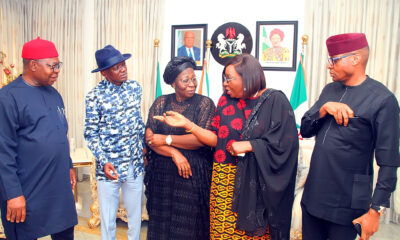Business
FEC Okays Nigeria To Sign African Free Trade Pact
The Federal Executive Council (FEC) has approved that Nigeria should sign the framework agreement for the establishment of African Continental Free Trade Area (AfCFTA) in Kigali, Rwanda.
AfCFTA is the first step in the implementation of AU Agenda 2063: the “Vision” for an integrated, prosperous and peaceful Africa.
The Minister of Industry, Trade and Investment, Mr Okechukwu Enelamah, made this known when he briefed State House correspondents alongside the Minister of Foreign Affairs, Mr Geoffrey Onyeama, on the outcome of the Council’s meeting.
The meeting was presided over by Vice-President Yemi Osinbajo at the Council Chamber of the Presidential Villa, Abuja.
Enelamah revealed that President Muhammadu Buhari would be signing the agreement on AfCFTA during the Extraordinary Meeting of African Union Heads of State and Government to be held on March 21.
“What we did today was to secure approval for the stage we are now.
“First, the Heads of State and Governments of the African Union (AU) in January 2012, made a decision in Addis Ababa to establish CFTA just as an economic policy and policy for regional integration and of course, in that process, we have got to a point where they set some deadlines.
“At meetings they had sometimes in 2016 and 2017, they wanted the framework agreement to be in place at the end of 2017 but they postponed it, that the heads of state will like to sign an agreement on March 21, 2018.
“So, that framework agreement is now scheduled to be signed in Kigali on March, 21 by the African Heads of State and Government,’’ he said.
The minister enumerated the benefits of the AfCFTA, saying that the agreement would expand market access for Nigeria’s exporters of goods and services, spur growth and boost job creation.
He said the agreement would “eliminate barriers against Nigeria’s products and provide a Dispute Settlement Mechanism for stopping the hostile and discriminatory treatment directed against Nigerian natural and corporate business persons in other African countries.
“Establish rules-based trade governance in intra-African trade to invoke trade remedies, such as safeguards, anti-dumping, and countervailing duties against unfair trade practices, including dumping, trans-shipment of concealed origin of products.’’
According to Enelamah, Nigeria will also express an interest to host the secretariat of AfCFTA in Abuja.
Also addressing the correspondents on the outcome of the meeting, the Minister of Water Resources, Alhaji Suleiman Adamu said the Council approved variation of the Jare earth dam project cost from N3 billion to N11 billion, with a mandate to complete the project within 36 months.
NAN reports that contract for the dam project, located in Bakori Local Government Area of Katsina state, was first awarded in 2006 at the cost of N3 billion, but was later abandoned
The Jare community had protested the non-completion of the dam for several years.
The community, under the umbrella of Jare Earth Dam Association, had in a letter to the government complained that they were short-changed by the committee responsible for the payment of compensation to people affected by the construction of the project.
Minister of the Federal Capital Territory (FCT)), Alhaji Muhammed Bello, who also spoke on the outcome of the meeting, said he briefed the council on the activities of the FCT since Nov. 2015.
He said that 17 projects were approved for the FCT by the Federal Executive Council in the period under review.
The minister added that the council approved N112 million for the final engineering work for the Karsana district in the FCT with a completion period of six weeks.(
Business
Expert Tasks Government On Civil Maritime Security Unit
Business
Bayelsa Recommits To Infrastructure, Sectoral Dev … Rakes In N227.185b From IGR
Business
NDYC Seeks NDDC Commercialisation … Uncompleted Projects Completion
-

 News19 hours ago
News19 hours agoS’South Deputy Govs Pay Condolence Visit To A’Ibom Colleague
-

 Niger Delta15 hours ago
Niger Delta15 hours agoHYPREP Presents Scholarship Grants To 300 Ogoni Postgraduate Students
-
Niger Delta17 hours ago
Environmentalist Makes Case For Oceans Preservation
-
Sports15 hours ago
Aruna, renew rivalry at Singapore Smash 2025
-
Business16 hours ago
Expert Tasks Government On Civil Maritime Security Unit
-
Politics18 hours ago
Edo Assembly Drags LG Chairmen To Court, Seeks LG Law Interpretation
-
Nation15 hours ago
Ahaoda West’s Impactful Projects Excite RIMA Boss
-
Niger Delta17 hours ago
A’Ibom CP Cautions Youth Against Violence In Oil Producing Communities

